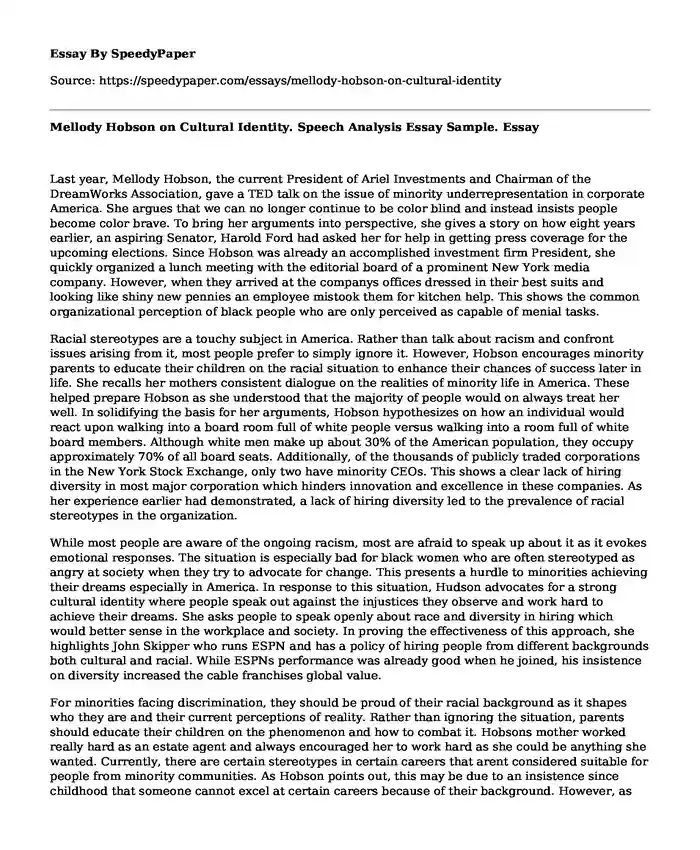
| Type of paper: | Essay |
| Categories: | Racism Discrimination Human resources |
| Pages: | 4 |
| Wordcount: | 855 words |
Last year, Mellody Hobson, the current President of Ariel Investments and Chairman of the DreamWorks Association, gave a TED talk on the issue of minority underrepresentation in corporate America. She argues that we can no longer continue to be color blind and instead insists people become color brave. To bring her arguments into perspective, she gives a story on how eight years earlier, an aspiring Senator, Harold Ford had asked her for help in getting press coverage for the upcoming elections. Since Hobson was already an accomplished investment firm President, she quickly organized a lunch meeting with the editorial board of a prominent New York media company. However, when they arrived at the companys offices dressed in their best suits and looking like shiny new pennies an employee mistook them for kitchen help. This shows the common organizational perception of black people who are only perceived as capable of menial tasks.
Racial stereotypes are a touchy subject in America. Rather than talk about racism and confront issues arising from it, most people prefer to simply ignore it. However, Hobson encourages minority parents to educate their children on the racial situation to enhance their chances of success later in life. She recalls her mothers consistent dialogue on the realities of minority life in America. These helped prepare Hobson as she understood that the majority of people would on always treat her well. In solidifying the basis for her arguments, Hobson hypothesizes on how an individual would react upon walking into a board room full of white people versus walking into a room full of white board members. Although white men make up about 30% of the American population, they occupy approximately 70% of all board seats. Additionally, of the thousands of publicly traded corporations in the New York Stock Exchange, only two have minority CEOs. This shows a clear lack of hiring diversity in most major corporation which hinders innovation and excellence in these companies. As her experience earlier had demonstrated, a lack of hiring diversity led to the prevalence of racial stereotypes in the organization.
While most people are aware of the ongoing racism, most are afraid to speak up about it as it evokes emotional responses. The situation is especially bad for black women who are often stereotyped as angry at society when they try to advocate for change. This presents a hurdle to minorities achieving their dreams especially in America. In response to this situation, Hudson advocates for a strong cultural identity where people speak out against the injustices they observe and work hard to achieve their dreams. She asks people to speak openly about race and diversity in hiring which would better sense in the workplace and society. In proving the effectiveness of this approach, she highlights John Skipper who runs ESPN and has a policy of hiring people from different backgrounds both cultural and racial. While ESPNs performance was already good when he joined, his insistence on diversity increased the cable franchises global value.
For minorities facing discrimination, they should be proud of their racial background as it shapes who they are and their current perceptions of reality. Rather than ignoring the situation, parents should educate their children on the phenomenon and how to combat it. Hobsons mother worked really hard as an estate agent and always encouraged her to work hard as she could be anything she wanted. Currently, there are certain stereotypes in certain careers that arent considered suitable for people from minority communities. As Hobson points out, this may be due to an insistence since childhood that someone cannot excel at certain careers because of their background. However, as her own life demonstrates, one can really be anything if they work hard at it. By speaking up, these minorities will act as role models for others who want to eliminate racial discrimination. This will create cultural identity both at the social and organizational level which will results in better relations and organizational innovation.
In conclusion, people should adopt a cultural identity of being color brave. The old paradigm of being colorblind means to ignore color and treat everyone equally regardless of their backgrounds. However, the current approach to color blindness has clearly failed with organizations having little diversity in hiring. Rather than being color blind, a more effective approach is being color brave where the public can start the initiative to go beyond racial differences before judging and individual. While it may seem counterintuitive to speak out for racial tolerance and diversity, in the long run it is worth it. Each persons cultural identity is unique and their experiences determine much of this identity. Having a tolerance perspective will allow people to learn from each others attributed knowledge while also offering diverse perspectives on an issue. As various corporations have shown, greater diversity when hiring results in above average performance due to the increased innovation and creativity which is critical for sustainable organizational preface. Additionally, minorities who achieve success server as role models for others in their communities thus giving them motivation to achieve their dreams.
Works Cited
Hobson, Mellody. "Color Blind or Color Brave?." TED. May 2014. Lecture.
Cite this page
Mellody Hobson on Cultural Identity. Speech Analysis Essay Sample.. (2019, Sep 16). Retrieved from https://speedypaper.net/essays/mellody-hobson-on-cultural-identity
Request Removal
If you are the original author of this essay and no longer wish to have it published on the SpeedyPaper website, please click below to request its removal:
- Finding Inspiration Is a Pressing Feature in Life, Free Essay
- Am I Dreaming - Personal Experience Essay Sample
- Free Essay Sample: Rita Dove and Her Writing Experience
- Juvenile Delinquency Essay Sample
- Critical Response to "Eat that Frog!" book by Brian Tracy
- Free Essay on Decision-Making and Consumer Behavior
- Essay Sample on Stuart Hall's Theory of Media - Encoding/Decoding
Popular categories




